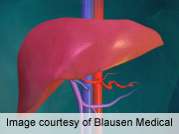(HealthDay)—For patients with type 1 diabetes, nonalcoholic fatty liver disease (NAFLD) is independently associated with the risk of incident chronic kidney disease (CKD), according to a study published online April 2 in Diabetes Care.
Giovanni Targher, M.D., from the University of Verona in Italy, and colleagues followed 261 adults with type 1 diabetes with preserved kidney function and with no macroalbuminuria at baseline for a mean of 5.2 years for incident CKD. Ultrasonography was used to diagnose NAFLD.
Patients had a mean estimated glomerular filtration rate (eGFR) of 92 ± 23 mL/min/1.73 m² at baseline; 89.7 and 10.3 percent had normoalbuminuria and microalbuminuria, respectively. About half of patients (50.2 percent) had NAFLD. The researchers found that 61 patients developed incident CKD during follow-up. An increased risk of CKD was associated with NAFLD (hazard ratio, 2.85; P < 0.001). This association was not attenuated appreciably by adjustment for age, sex, duration of diabetes, hypertension, glycated hemoglobin, and baseline eGFR (adjusted hazard ratio, 2.03; P < 0.01). After exclusion of those with microalbuminuria at baseline, the association was still significant (adjusted hazard ratio, 1.85; P < 0.05). The discriminatory capability of regression models for predicting CKD was significantly improved with addition of NAFLD to traditional CKD risk factors (with NAFLD: c-statistic, 0.79 versus 0.76 without NAFLD; P = 0.002).
"Further large, long-term prospective studies are needed to confirm our results (before suggesting a routine liver ultrasound examination in all patients with type 1 diabetes to better predict the future development of CKD)," the authors write.
More information:
Abstract
Full Text (subscription or payment may be required)
Journal information: Diabetes Care
Copyright © 2014 HealthDay. All rights reserved.


















